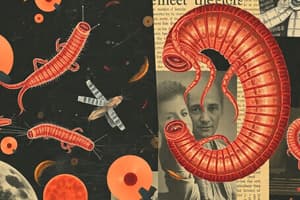Podcast
Questions and Answers
How do Leishmania species avoid destruction inside immune cells?
How do Leishmania species avoid destruction inside immune cells?
- By using host cell nutrients to destroy immune cells
- By replicating outside the host cells
- By altering the host cell nucleus
- By producing molecules that neutralize reactive oxygen species (correct)
Which mechanism is primarily used by Trypanosoma brucei to evade the immune response?
Which mechanism is primarily used by Trypanosoma brucei to evade the immune response?
- Occupy receptor sites on immune cells
- Alter the blood pH to incapacitate immune cells
- Induce the production of antibodies against itself
- Shed old VSG proteins and undergo antigenic variation (correct)
What role do regulatory T cells (Tregs) play in the presence of helminths like Schistosoma mansoni?
What role do regulatory T cells (Tregs) play in the presence of helminths like Schistosoma mansoni?
- Inducing apoptosis in infected cells
- Activating antibodies to neutralize parasites
- Enhancing the immune response against the parasite
- Suppressing effector immune responses (correct)
How does Toxoplasma gondii replicate without triggering an immune response?
How does Toxoplasma gondii replicate without triggering an immune response?
What strategy does Entamoeba histolytica use to escape immune detection?
What strategy does Entamoeba histolytica use to escape immune detection?
What effect does Fasciola hepatica have on dendritic cells?
What effect does Fasciola hepatica have on dendritic cells?
How does Leishmania major affect the processing and presentation of antigens?
How does Leishmania major affect the processing and presentation of antigens?
What is a common characteristic of Echinococcus granulosus in its interaction with immune cells?
What is a common characteristic of Echinococcus granulosus in its interaction with immune cells?
What mechanism involves parasites changing their surface proteins to avoid being recognized by the host's immune system?
What mechanism involves parasites changing their surface proteins to avoid being recognized by the host's immune system?
Which parasite is known for altering the expression of its PfEMP1 protein to evade host immunity?
Which parasite is known for altering the expression of its PfEMP1 protein to evade host immunity?
What is the process by which parasites resemble host molecules to avoid immune detection called?
What is the process by which parasites resemble host molecules to avoid immune detection called?
Which parasite is known to coat itself with host proteins like immunoglobulins for immune evasion?
Which parasite is known to coat itself with host proteins like immunoglobulins for immune evasion?
Which mechanism involves parasites preventing effective immune responses by manipulating the host's immune cells?
Which mechanism involves parasites preventing effective immune responses by manipulating the host's immune cells?
What term describes areas in the host's body where immune access is limited, allowing certain parasites to reside?
What term describes areas in the host's body where immune access is limited, allowing certain parasites to reside?
Which of the following parasites is known to sequester in the liver to avoid immune cells?
Which of the following parasites is known to sequester in the liver to avoid immune cells?
Which of the following strategies involves reducing the production of cytokines and nitric oxide in macrophages?
Which of the following strategies involves reducing the production of cytokines and nitric oxide in macrophages?
Flashcards
Antigenic Variation
Antigenic Variation
Parasites change surface proteins to avoid recognition by the host's immune system.
Molecular Mimicry
Molecular Mimicry
Parasites produce molecules resembling host molecules to evade immune detection.
Immunosuppression
Immunosuppression
Parasites actively suppress the host's immune response to facilitate their survival.
Immune Privilege/Sequestration
Immune Privilege/Sequestration
Signup and view all the flashcards
Inhibition of Phagocytosis and Intracellular Killing
Inhibition of Phagocytosis and Intracellular Killing
Signup and view all the flashcards
Shedding of Surface Antigens
Shedding of Surface Antigens
Signup and view all the flashcards
Induction of Regulatory T Cells (Tregs)
Induction of Regulatory T Cells (Tregs)
Signup and view all the flashcards
Modulation of Host Immune Cells
Modulation of Host Immune Cells
Signup and view all the flashcards
Blocking Antigen Processing and Presentation
Blocking Antigen Processing and Presentation
Signup and view all the flashcards
Plasmodium falciparum
Plasmodium falciparum
Signup and view all the flashcards
Trypanosoma brucei
Trypanosoma brucei
Signup and view all the flashcards
Schistosoma species
Schistosoma species
Signup and view all the flashcards
Entamoeba histolytica
Entamoeba histolytica
Signup and view all the flashcards
Leishmania donovani
Leishmania donovani
Signup and view all the flashcards
Toxoplasma gondii
Toxoplasma gondii
Signup and view all the flashcards
Plasmodium species
Plasmodium species
Signup and view all the flashcards
Study Notes
Antigenic Variation
- Parasites change surface proteins to avoid host immune recognition
- Plasmodium falciparum (Malaria) alters expression of PfEMP1 protein on infected red blood cells
- Trypanosoma brucei (African trypanosomiasis) frequently switches Variant Surface Glycoprotein (VSG) coat
Molecular Mimicry
- Parasites produce molecules resembling host molecules, evading immune detection
- Schistosoma species (Blood flukes) coat themselves with host proteins like immunoglobulins and complement proteins
- Entamoeba histolytica expresses host-like carbohydrates on its surface
Immunosuppression
- Parasites actively suppress host immune response
- Leishmania donovani (Leishmaniasis) manipulates macrophages, decreasing antigen presentation and pro-inflammatory cytokine production (diminished T-cell response)
- Toxoplasma gondii (Toxoplasmosis) inhibits nitric oxide and IL-12 production in macrophages, dampening immune response
Immune Privilege/Sequestration
- Some parasites reside in areas of the host's body where the immune system has limited access
- Plasmodium species sequester in the liver and deep tissues
- Trypanosoma cruzi (Chagas disease) hides inside muscle cells and other tissues
Inhibition of Phagocytosis and Intracellular Killing
- Parasites avoid destruction inside macrophages by preventing phagocytosis or surviving intracellularly
- Leishmania species survive within macrophage phagolysosomes by producing molecules that neutralize reactive oxygen species (ROS)
- Toxoplasma gondii modifies the host cell environment to form a specialized parasitophorous vacuole
Shedding of Surface Antigens
- Parasites shed surface antigens to escape antibody-mediated immune responses
- Entamoeba histolytica releases surface antigens
- Trypanosoma brucei sheds old VSG proteins
Induction of Regulatory T Cells (Tregs)
- Some parasites induce Tregs, downregulating the immune response and promoting tolerance
- Helminths (e.g., Schistosoma mansoni) induce Tregs secreting IL-10 and TGF-β, suppressing effector immune responses
- Filarial worms (e.g., Wuchereria bancrofti) trigger regulatory pathways, resulting in immunosuppression
Modulation of Host Immune Cells
- Parasites alter the behavior and function of host immune cells
- Echinococcus granulosus (Hydatid disease) secretes molecules that modulate dendritic cell function, preventing T cell activation
- Fasciola hepatica (Liver fluke) produces molecules that inhibit dendritic cell maturation and T cell activation, promoting immune tolerance
Blocking Antigen Processing and Presentation
- Parasites interfere with the host's ability to process and present antigens to T cells
- Leishmania major disrupts the function of MHC class II molecules in infected macrophages, preventing activation
Studying That Suits You
Use AI to generate personalized quizzes and flashcards to suit your learning preferences.





